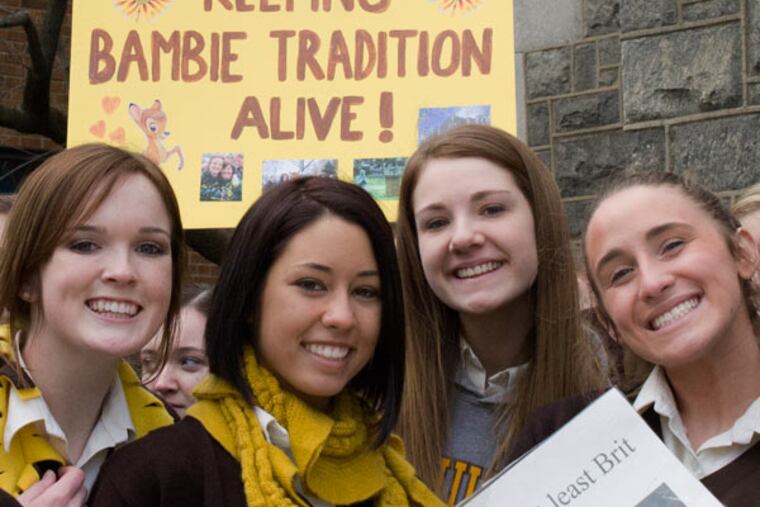Philadelphia Archdiocese plan to restructure education showing progress
St. Hubert Catholic High School for Girls in Holmesburg marked the one-year anniversary of its rescue from closing last week with a march, rally, and Mass of Thanksgiving.

St. Hubert Catholic High School for Girls in Holmesburg marked the one-year anniversary of its rescue from closing last week with a march, rally, and Mass of Thanksgiving.
Monsignor Bonner-Archbishop Prendergast Catholic High School in Drexel Hill celebrated with pretzels, a dress-down day, and played pop songs when class periods changed.
But in the 12 months since Archbishop Charles J. Chaput announced a plan to restructure Catholic education in the Archdiocese of Philadelphia that spared four high schools from closing, the most dramatic changes were less visible.
The independent Faith in the Future Foundation is managing all 17 Catholic high schools.
Total Catholic high school deficit has dropped from nearly $6 million to $500,000.
Enrollment is growing.
A local foundation has launched a program to provide annual $2,000 scholarships for four years to 125 high school freshmen.
And an executive board has been created to advise the 122 Catholic elementary schools.
Those are just some of the turnarounds since Chaput's Feb. 24, 2012, announcement that transformed the landscape of Catholic education in the five-county archdiocese.
"We could not have even conceived of this a year ago," the Rev. James P. Olson, president of Bonner-Prendergast, said Friday. "Sometimes when I go home and sit down at night, I think, 'Did all this really happen?' "
The turmoil started in January 2012, when Chaput announced a blue-ribbon panel had recommended closing 45 of the 156 elementary schools and four of the 17 high schools to stem deficits and cope with plunging enrollment.
The panel, established by Chaput's predecessor, said drastic action was needed to strengthen Catholic education in the face of a 38 percent drop in elementary enrollment since 2001 and a 34 percent decline at the high schools.
The commission also urged the archdiocese to consolidate struggling parish schools and set up a foundation to raise money.
Most targeted schools mounted appeals. In the end, 34 fewer elementary schools opened in September, and many became regional schools.
All four high schools slated to close were saved. Chaput announced that businesses and supporters had pledged money to keep them open and that the Faith in the Future Foundation was being created to raise $100 million for schools over five years.
The threat of massive closings prompted an outpouring of support for Catholic education that not only helped schools raise money but recruited new students.
"There is a new energy throughout the system to stabilize and grow enrollment," said H. Edward Hanway, president of Faith in the Future, which has been managing the high schools since August.
"The real focus on enrollment paid off," he said, noting that 3 percent more students were in Catholic schools this academic year than projected, although there was still a decline.
Samuel Casey Carter, the foundation's chief executive, said the total enrollment of 59,524 worked out to 14,219 in high schools and 45,305 in elementary schools.
Hanway and Carter credit the schools with beefing up recruitment. The freshmen class at many high schools is the largest in years, and prospects for next fall are even stronger.
Brother Richard Kestler, president of West Catholic High School - one of those spared - has 51 freshmen this year.
The school has held open houses and visited Catholic elementary, charter, and public schools. With 92 freshmen registered for next fall, Kestler said West was on target to meet its goal of 140.
Hanway and Carter said the expansion of financial aid had helped more families who struggled to pay the $6,000 tuition to send their children to Catholic high schools. Elementary tuition varies, but the average is $3,000.
In addition to money the foundation and the schools raised for aid, some families benefited from the expansion of Pennsylvania programs that give tax credits to corporations for donations to scholarship programs to help low-income students attend nonpublic schools.
Carter also said the Maguire Foundation in West Conshohocken was giving $5 million for a new scholarship program. Starting in the fall, 125 freshmen will receive $2,000 in each of their four years for Catholic high school tuition.
He said Faith in the Future and the Maguire Foundation hoped the donation would spur others to give.
Hanway said improved enrollment and operational efficiencies schools adopted helped slash the high schools' total deficit from just under $6 million projected a year ago to $500,000.
And although Faith in the Future has focused on the high schools, an advisory board has been formed to assist elementary schools with planning, marketing, enrollment, and governance.
The archdiocese will announce publicly Monday the Executive Board of Elementary Education that has been working behind the scenes with the elementary schools since October. Bishop Michael J. Fitzgerald, who oversees Catholic education in the archdiocese, is the chairman.
The blue-ribbon commission last year had recommended forming such a board.
And advisory councils for the elementary schools are being established in each of the five counties.
"It really will give us a more countywide focus for better strategic planning and get more local people involved," said Gerald J. Parsons, a member of the Faith in the Future board involved with the elementary-school initiative.
The archdiocese said the councils would include principals, pastors, parents, and community representatives.